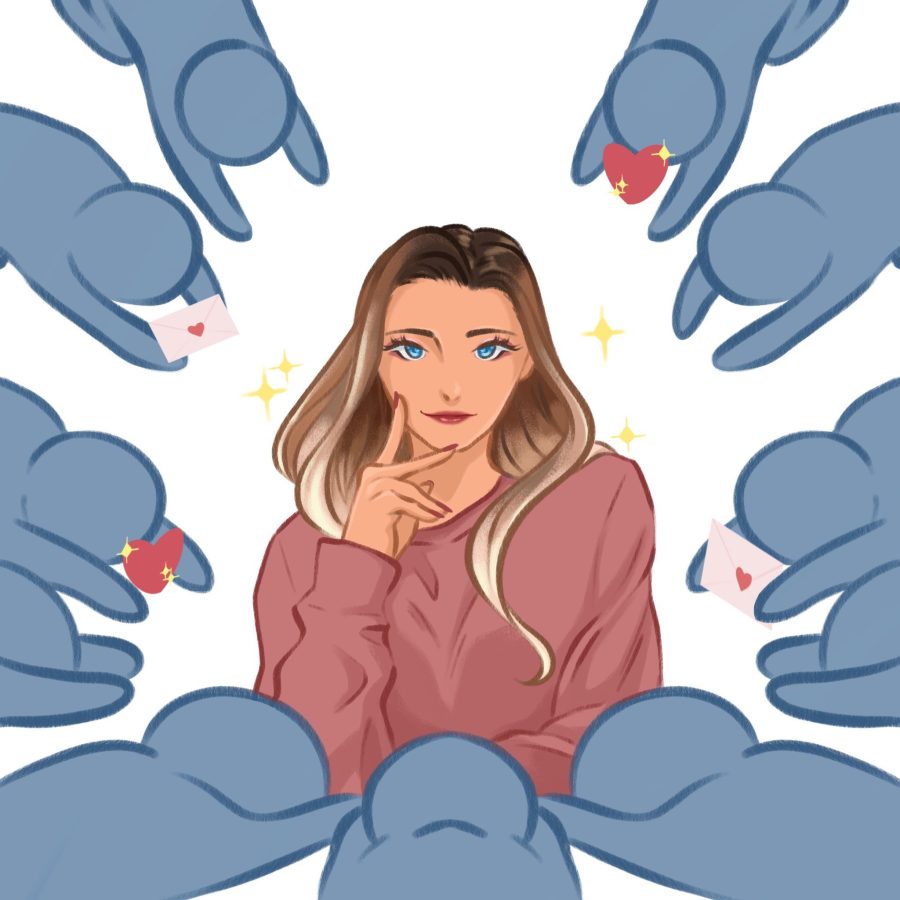As senior Eva Salvatierra scrolls through her feed on social media, she can’t help but notice the similarities in looks between each girl who crosses her screen. To her, many of the girls she sees on social media gain their mass followings with the help of their looks and the way they satisfy society’s beauty standards.
‘Pretty privilege’, a term to describe the idea that conventionally attractive people receive more opportunities in their lives than others, is alive and well, Salvatierra said, even in the lives of teens.
“It’s very present in a high school environment,” Salvatierra said. “I think it’s important to know that pretty privilege is not just about whether people find your face attractive. It’s if your body is fitting the thin body standard while also having a postpubescent body that our models and actresses look like.”
During high school, students are navigating their social life and creating relationships with potential life-long friends. Salvatierra said that many students will make decisions about who to associate with based on how conventionally attractive people will impact their lives.
“Your entire (high school) experience can be more positive (if you’re more attractive) because people will treat you better by either associating with you to increase their social status or wanting to get on your good side since pretty people are seen to have more power in society,” Salvatierra said.
Sophomore Trey Collins agrees and said pretty privilege is a defining aspect of the social culture at Paly. “I think a lot of people care about your looks at Paly,” Collins said. “It’s sad, but a lot of people base their friendships off of it and relationships too.”
Collins said he attributes the presence of pretty privilege in high school, especially at Paly, to the human desire for power. He said people think that by associating with conventionally pretty people, they will look cooler.
While pretty privilege is present within a high school environment, adults say they see the effect of it too, especially in the workplace, according to women’s studies professor Lori Baker-Sperry at Western Illinois University. She said women who invest in their appearance are more likely to be respected and successful in the workplace.
The perpetuation of pretty privilege from high school to work can negatively impact women whose appearances change with respect to beauty standards, Salvatierra said. She said this is especially present with women after having their first child.
“You might be treated differently by society if you’ve had a child because society likes young, thin women, and our patriarchy tells us that our value declines after we have our first child,” Salvatierra said “I think that the consequences of that in our adulthood are pretty severe because you’ve learned how society treats you based on your looks and that can affect your confidence in the workplace.”
Beauty standards have been present in society since Ancient Rome and Greece. These standards have changed, adapting to the cultures and values of the time. Salvatierra also said current beauty standards can be attributed to a white, patriarchal society.
“A lot of pretty privilege stems from white supremacy, but also beauty privilege is a manifestation of the patriarchy,” Salvatierra said. “I think that, in particular, women are seen as pretty if they fit the pretty image that a patriarchal society wants them to fit.”
In fact, Salvatierra said men cannot experience pretty privilege to the extent that women do.
“Men don’t have to be seen as the hottest man in the world to already have power, to manipulate systems and to make more money,” Salvatierra said. “Whereas a pretty woman’s power in a patriarchal society is limited to their ability of rising above based on their image.”
Collins agrees and said men allow pretty privilege to exist.
“It’s more of a factor with girls because guys create conditions with their beauty standards, which allows girls to receive pretty privilege,” Collins said.
Along with being created by the patriarchy, beauty standards are influenced by the brain’s innate attraction to symmetry, psychology teacher Melinda Mattes said.
“People with more symmetrical faces tend to be judged as being more beautiful,” Mattes said. “Biologically, symmetry correlates with other things such as better health outcomes, fertility, and all sorts of stuff. So from an evolutionary perspective, symmetry, which is equated with beauty, is sort of a proxy for a healthy mate.”
While pretty privilege is a result of society, bias is also an aspect of it. Mattes said bias is created based on what we’ve experienced, what we’ve been told and what we see. Our brain is conditioned to have a bias because it simplifies the decision making process.
“We have to take these mental shortcuts because we don’t have time — as social creatures we are constantly interacting with others — to get to know every facet of every individual we interact with,” Mattes said. “So we use a lot of what we can observe as a shortcut.”
In order to dismantle pretty privilege, Mattes said people need to be more aware of their bias.
“The problem is when bias gets in the way of making decisions, and we make inaccurate or inappropriate ones,” Mattes said. “The idea that we are biased is part of the human condition, and it’s on us to try to live more harmoniously with the idea that there is a bias.”

